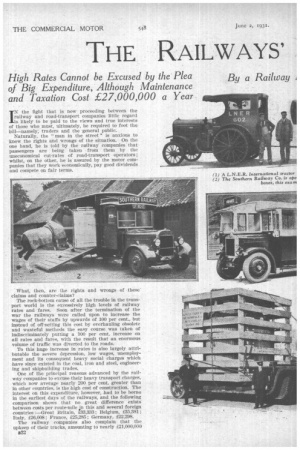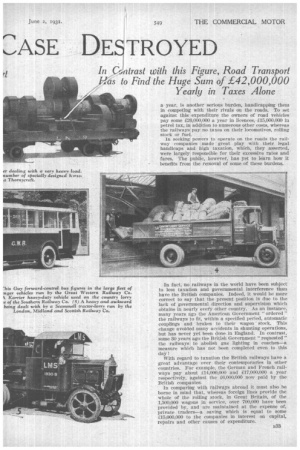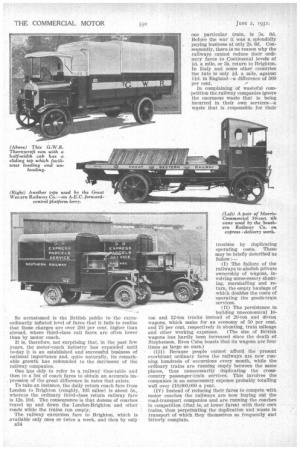THE RAILWAYS' 2ASE DESTROYED
Page 50

Page 51

Page 52

If you've noticed an error in this article please click here to report it so we can fix it.
By a Railway
IN the fight that is now proceeding between the railway and road-transport companies little regard is likely to be paid to the views and true interests of those who must, ultimately, be required to foot the bill—namely; traders and the general public.
Naturally, the "man in the street ' is anxious to know the rights and wrongs of the situation. On the one hand, he is told by the railway companies that passengers are being taken • from them by the uneconomical cut-rates of road-transport operators; whilst, on the other, he is assured by the motor companies that they work economically, pay good dividends and compete on fair terms.
What, then, are the rights and wrongs of these claims and counter-claims?
The rock-bottom cause of all the trouble in the transport world is the excessively high levels of railway rates and fares. Soon after the termination of the war the railways were called upon to increase the wages of their staffs by upwards of 100 per cent., but instead of off-setting this cost by overhauling obsolete and wasteful methods the easy course was taken of indiscriminately putting a 100 per cent. increase on all rates and fares, with the result that an enormous volume of traffic was diverted to the roads.
To this huge increase in rates is also largely attributable the severe depression, low wages, unemployment and its consequent heavy social charges which have since existed in the coal, iron and steel, engineering and shipbuilding trades.
One of the principal reasons advanced by the railway companies to excuse their heavy transport charges, which now average nearly 200 per cent, greater than in other countries, is the high cost of construction. The interest on this expenditure, however, had to be borne in the earliest days of the railways, and the following comparison shows that no great difference exists between costs per route-mile In this and several foreign countries :—Great Britain, £33,333; Belgium, £35,381; Italy, £28,008; Prance, £25,285; Germany, £22,298.
The railway companies also complain that the upkeep of their tracks, amounting to nearly £21,000,000 B32 a• year, is another serious burden, handicapping them in competing with their rivals on the roads. To set against this expenditure the owners of road vehicles' pay some 120,000,000 a year in licences, 115,000,000 in petrol tax, in addition to numerous other costs, whereas the railways pay no taxes on their locomotives, rolling stock or fuel.
In seeking powers to operate on the roads the railway companies made • great play with their legal handicaps and high taxation, which, they asserted, were largely responsible for their excessive rates and fares. The Public, however, has yet to learn how it benefits from the removal of some of these burdens.
In fact, no railways in the world have been subject to less taxation and governmental interference titan have the British companies. Indeed, it would be more correct to say that the present position is due to the lack of governmental direction and supervision which obtains in nearly eveiy other country. As an instance, many years ago the American Government " ordered " the railways to fit, within a specified period, automatic couplings and brakes to their wagon stock. This change avoided many accidents in shunting operations, but has never yet been done in England. In contrast, some 30 years ago the British Government " requested " the railways to abolish gas lighting in coaches—a measure which has not been completed even to this day !
With regard to taxation the British railways have a great advantage over• their contemporaries in other countries. For example, the German and French railways pay about 114,000,000 and £17,000,000 a year respectively, .against the 16,000,000 now paid by the British companies_ In comparing with railways abroad it must also he borne in mind that, whereas foreign line's provide the whole of the rolling stock, in Great Britain, of the 1,500,000 wagons in service, over 700,000 have been provided by, and are maintained at the expense of, private traders—a saving which is equal to some 115,000,000 to the companies in interest on capital, repairs and other causes of expenditure. So accustomed is the British public to the extraordinarily inflated level of fares that it fails to realize that these charges are over 200 per cent. higher than abroad, where third-class rail fares are often lower than by motor coach.
It is, therefore, not surprising that, in the past few years, the motor-coach industry has expanded until to-day it is an established and successful business of national importance and, quite naturally, its remarkable growth has redounded to the detriment of the railway companies.
One has ohly to refer to a railway time-table and then to a list of coach fares to obtain an accurate impression of the great difference in rates that exists.
To take an instance, the daily return coach fare from London to Brighton (roughly, 105 miles) is about 5s., whereas the ordinary third-class return railway fare is 12s. 10d. The consequence is that dozens of coaches travel up and down the •London-Brighton and other roads while the trains run empty.
The railway excursion fare to Brighton, which Is available only once or twice a week, and then by only B34
one particular train, is 5s. 9(1. Before the war it was a splendidly paying business at only 2s. ed. Consequently, there is DO reason why the railways cannot reduce their ordinary fares to Continental levels of id. a mile, or 5s. return to Brighton. In Italy and some other' countries the rate is only Id. a mile, against lid. in England—a difference of 500 per cent.
In complaining of wasteful competition the railway companies ignore the enormous waste that is being incurred in their own services—a waste that is responsible for their troubles by duplicating operating costs. These may be briefly described as follow :— (I) The failure of the railways to abolish private ownership of wagons, involving unnecessary shunting, marshalling and return, the empty haulage of which doubles the costs of operating the goods-train services.
(II) The persistence in building uneconomical 10ton and 12-ton trucks instead of 20-ton and 40-ton wagons, which make for an economy of 50 per cent. and 75 per cent. respectively in shunting, train mileage and other working expenses. (The size of British wagons has hardly been increased since the death of Stephenson. Even Cuba boasts that its wagons are four times as large as ours.) (III) Because people cannot afford the present exorbitant ordinary fares the railways are now running hundreds of excursions every month, while the ordinary trains are running empty between the same places, thus unnecessarily duplicating the crosscountry passenger-train services. This involves the companies in an unnecessary expense probably totalling well over £10,000,000 a year.
(IV) Instead of reducing their fares to compete with motor coaches the railways are now buying out the road-transport companies and are running the coaches in competition (that is, at lower fares) with their own trains, thus perpetuating the duplication and waste in transport of which they themselves so frequently and bitterly complain.




































































































